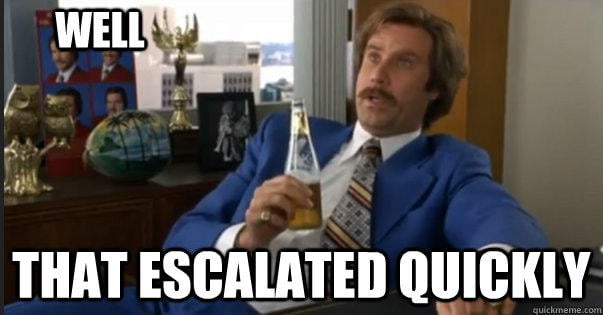Don't get me wrong, I'm as aware as anyone of the need to have some ideas/concepts down stone cold. You miss a tummy ache abruptly becoming sharp RLQ pain, things can go south quick. But how often have you sat through an hour long lecture that could have been summed up in about 5 slides w/3 bullet points a piece? Is it 100% necessary I know what squamous cell carcinoma looks like on a slide given I have no intention of going into path? Or would it be enough for me to recognize concerning lesions, hx, and sx so that I can order the biopsy, and let the expert who's job it is to look at these things day in and day out determine cell line/origin?
I don't know, part of it is M2 fatigue heading into boards, but it seems like this year has just been BS-strokefest block after block. Crap I know, beyond any shadow of a doubt, I will never again see in my life unless I go into that exact specialty, and even then maybe not. Our medical education system is setup to train generalists, and that just doesn't exist anymore. Medicine is hyper-specialization central, and unless you go into primary care you can very easily forget 60% of the junk you paid an exorbitant amount of money to be told to memorize. It's particularly annoying when ever damned clinician who comes into read their PP slides to you, because they haven't seen them since last year when they gave this one lecture they are forced to, tells you they're going to teach you "real things" so that you can be "good to go on wards" and "Not just pass a standardized test". Well, screw you buddy. That "standardized test" determines whether I get to pick what I want to do for the rest of my life, or work in a field I don't like for the rest of my life. So, no, I don't give two ****s if I'm an incompetent boob the second I'm done with Step 1- I'll cross that bridge when I get there. And, pro-tip, if you and every other clinician thinks step 1 isn't preparing us for real-world medicine, why are you still using it as a basis to grant residency interviews? Would the world truly end if step 1 was pass fail, especially as it is a licensing exam and was never intended to be used as a metric of knowledge/worth/value?
What, I think, irks me the most is that the segmented hyper-specialized nature of medicine is driven by a very realistic and honest admission on the part of the professionals in our industry: you do well what you do often. And so once we jump through all the idiotic hoops of "medical school", we do what we probably should have been doing the whole time- learning by doing. When I interviewed at USHS they summed it up perfectly when addressing a persons concern about school and war "You won't go into active service while you're in medical school, we won't interrupt your education for that. Why would we? You're basically of no use to us until residency." (paraphrase, it's been 2+years). No one actually believes medical school prepares you to be a physician. Medical school prepares you to be a resident, where you learn to be a physician. And residency programs are acknowledgements that you learn best through exposure and repetition. Which is exactly the opposite of the rapid fire, cram-tastic way medical school is setup.





